POP LIFE INTERVIEW: Designing your own life with Debbie Travis.
 This week on “Pop Life” design expert Debbie Travis shares stories about her career and how she knows when it’s time to move on.
This week on “Pop Life” design expert Debbie Travis shares stories about her career and how she knows when it’s time to move on.
Watch the whole thing HERE!
 This week on “Pop Life” design expert Debbie Travis shares stories about her career and how she knows when it’s time to move on.
This week on “Pop Life” design expert Debbie Travis shares stories about her career and how she knows when it’s time to move on.
Watch the whole thing HERE!
 Check out the Richard Crouse Show on NewsTalk 1010 for November 10, 2018! This week Richard welcomes Sam Maggs, a best-selling writer of books, comics, and video games. She’s a Senior Writer for Insomniac Games; the author of “The Fangirl’s Guide to the Galaxy,” “Wonder Women,” and “Girl Squads.” Listen to the whole thing HERE!
Check out the Richard Crouse Show on NewsTalk 1010 for November 10, 2018! This week Richard welcomes Sam Maggs, a best-selling writer of books, comics, and video games. She’s a Senior Writer for Insomniac Games; the author of “The Fangirl’s Guide to the Galaxy,” “Wonder Women,” and “Girl Squads.” Listen to the whole thing HERE!
A fun and feisty tour of famous girl BFFs from history who stuck together and changed the world.
A modern girl is nothing without her squad of besties. But don’t let all the hashtags fool you: the #girlsquad goes back a long, long time. In this hilarious and heartfelt book, geek girl Sam Maggs takes you on a tour of some of history’s most famous female BFFs, including:
Here’s some info on The Richard Crouse Show!:
Each week on the nationally syndicated Richard Crouse Show, Canada’s most recognized movie critic brings together some of the most interesting and opinionated people from the movies, television and music to put a fresh spin on news from the world of lifestyle and pop-culture. Tune into this show to hear in-depth interviews with actors and directors, to find out what’s going on behind the scenes of your favourite shows and movies and get a new take on current trends. Recent guests include Ethan Hawke, director Brad Bird, comedian Gilbert Gottfried, Eric Roberts, Brian Henson, Jonathan Goldsmith a.k.a. “The most interesting man in the world,” and best selling author Linwood Barclay.
Click HERE to catch up on shows you might have missed! Read Richard NewsTalk 1010 reviews HERE!
The show airs:
NewsTalk 1010 – airs in Toronto Saturday at 9 to 10 pm.
For Niagara, Newstalk 610 Radio – airs Saturdays at 6 to 7 pm
For Montreal, CJAD 800 – Saturdays at 6 to 7 pm
For Vancouver – CFAX 1070 – Saturdays 6 to 7 pm.
For London — Newstalk 1290 CJBK, Saturdays 10 to 11 pm
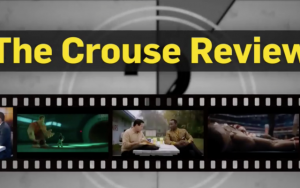 A weekly feature from from ctvnews.ca! The Crouse Review is a quick, hot take on the weekend’s biggest movies! This week Richard looks at the Michael B. Jordan boxing drama “Creed II,” the on-line romp of “Ralph Breaks the Internet” and the odd couple buddy film “Green Book.”
A weekly feature from from ctvnews.ca! The Crouse Review is a quick, hot take on the weekend’s biggest movies! This week Richard looks at the Michael B. Jordan boxing drama “Creed II,” the on-line romp of “Ralph Breaks the Internet” and the odd couple buddy film “Green Book.”
Watch the whole thing HERE!
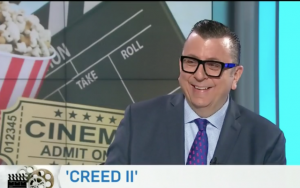 Richard sits in with CTV NewsChannel anchor Jennifer Burke to have a look at the weekend’s big releases, the boxing drama “Creed II,” the on-line romp of “Ralph Breaks the Internet” and the odd couple buddy film “Green Book.”
Richard sits in with CTV NewsChannel anchor Jennifer Burke to have a look at the weekend’s big releases, the boxing drama “Creed II,” the on-line romp of “Ralph Breaks the Internet” and the odd couple buddy film “Green Book.”
Watch the whole thing HERE!
 We hope that you’ll join us on Saturday, December 1st as we welcome special guests, poet/author, Lee Maracle and film critic, Richard Crouse!
We hope that you’ll join us on Saturday, December 1st as we welcome special guests, poet/author, Lee Maracle and film critic, Richard Crouse!
Monkey Toast is a six-time Canadian Comedy Award winning talk/improv show. Each show our host interviews two different celebrity guests. After an interview segment the focus shifts to the Monkey Toast Players, six of the best improvisers in the world, who use the interview as springboard for their improvised scenes. The show then goes back and forth between interview and improv.
Starring The Monkey Toast Players: Lisa Merchant, Marty Adams, Christy Bruce, Albert Howell, Jack Mosshammer and Jim Annan. Music by Ayaka Kinugawa. Hosted by David Shore.
8 pm – 10 pm at the Social Capital Theatre (154 Danforth Ave – Second Floor, Toronto, Ontario) Buy tickets HERE!
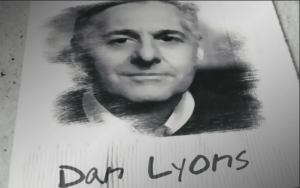 Richard asks “Lab Rats” author Dan Lyons Dan Lyons about his take on how the workforce has changed over the years and where it leaves millennials.
Richard asks “Lab Rats” author Dan Lyons Dan Lyons about his take on how the workforce has changed over the years and where it leaves millennials.
Watch the whole thing HERE!
 The “Pop Life” panel, Pamela Ross, Culture Agent At Blue Rebel Works, Rachel Blake, Canada Regional Operations Lead at Twitter and Kris Martinez, Mayor at Gadventures, share their take on what matters most when it comes to a job – management style or work perks?
The “Pop Life” panel, Pamela Ross, Culture Agent At Blue Rebel Works, Rachel Blake, Canada Regional Operations Lead at Twitter and Kris Martinez, Mayor at Gadventures, share their take on what matters most when it comes to a job – management style or work perks?
Watch the whole thing HERE!
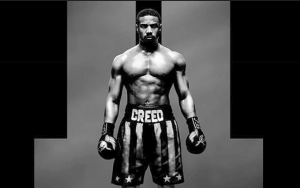 Whoever said history never repeats didn’t work in Hollywood. Remakes and reboots have taken over theatres, recycling ideas and characters in what can sometimes feel like a continuous case of déjà vu. This week we have “Creed II” a sequel to a reboot, which is also a remake of sorts of a film made before star Michael B. Jordan was even born.
Whoever said history never repeats didn’t work in Hollywood. Remakes and reboots have taken over theatres, recycling ideas and characters in what can sometimes feel like a continuous case of déjà vu. This week we have “Creed II” a sequel to a reboot, which is also a remake of sorts of a film made before star Michael B. Jordan was even born.
When we last saw Adonis Creed (Jordan) he was a young man who never knew his dad, former world champion boxer Apollo Creed. He did, however, inherit the old man’s love of boxing and much of his skill. Working with his dad’s old friend Rocky Balboa (Sylvester Stallone) to get into ring-ready shape he, like his father before him, wins the respect of the boxing world.
In the new film he finds confronted by his father’s legacy in the form of Viktor Drago (Florian Munteanu), the son of the man who killed Apollo in the ring decades ago.
The year was 1985. Apollo Creed came out of a five-year retirement to give Soviet Olympic boxer Ivan Drago (Dolph Lundgren) a good old-fashioned American pummelling. Instead, with Rocky in his corner, Apollo is beaten senseless by the 6 foot 5 inch steroid-enhanced Russian. Just as Rocky drops the towel to end the fight Drago delivers the coup de grâce, a fatal blow that kills Apollo in centre ring. Determined to avenge Apollo’s death Rocky squares off with Drago in the Soviet Union in a Christmas season match. Journeyman Rocky shocks the world by winning, beating the statuesque Eastern Bloc fighter by knockout.
Flash forward to “Creed II.” The sting of that Reagan-era loss still bothers Drago (Lundgren, who else?). Shaping his son Viktor (Florian Munteanu) into a lean, mean fighting machine. Drago seeks to vicariously regain honour in the ring. “In Russia,”
Drago says, “no one will touch the Drago name. Everything changed that night.”
Father and son challenge Adonis, now the world heavyweight champion, to a match. “My son will break your biy,” Drago says, taunting Rocky. Despite Rocky’s warnings Adonis accepts the fight, looking for vengeance for a man he never knew. The showdown between the duelling sons brings into focus the shared legacy of the four men, Adonis, Viktor, Drago and Rocky.
“Creed II” isn’t really a movie about boxing. There are two brutal fight scenes but narratively this is about finding a sense of purpose, inside and outside of the ring. It’s about the why rather than the how. On that score it works. Director Steven Caple Jr. focuses on the characters allowing us to get to know them better, or in the case of Rocky and Drago, get reacquainted with them.
The film takes its time setting up the relationships before getting into the more traditional “Rocky” tropes, ie: unconventional but effective training methods and a rousing finale, complete with a riff on Bill Conti’s rousing “Rocky” theme song “Gonna Fly Now.”
This study of fathers and sons, of vengeance and reputation is really a look at brittle masculinity. These characters are all broken somehow, looking for something they are unlikely to find in the ring. “Why do you fight?” Rocky asks Adonis several times, sending him off on an introspective journey that leads him back to where his quest began, his father.
“Creed II” reverberates with the echoes of “Rocky” past but transcends being an exercise in déjà vu by amping up the emotional content to TKO levels. It is neither a rehash nor completely original work. It’s simply another puzzle piece in the feel good “Rocky” saga.
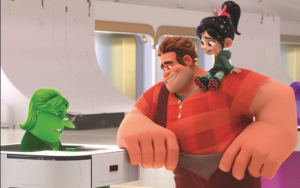 Given the movie’s subtext “Ralph Breaks the Internet” could have been called “Ralph Wants You to Think About the Ramifications of Internet Usage.” Not as catchy, I’ll admit, but amid the fun and games the sequel to “Wreck-It Ralph” is a strong message about the dangers of Internet culture.
Given the movie’s subtext “Ralph Breaks the Internet” could have been called “Ralph Wants You to Think About the Ramifications of Internet Usage.” Not as catchy, I’ll admit, but amid the fun and games the sequel to “Wreck-It Ralph” is a strong message about the dangers of Internet culture.
It’s been six years since we met Wreck-It Ralph (voice of John C. Reilly), a disgruntled video game character who demanded respect. This time around the action begins when the steering wheel controller on the Sugar Rush game console breaks. “It might be time to sell Sugar Rush for parts,” says Stan Litwak (Ed O’Neill), owner of Litwak’s Family Fun Center & Arcade.
Before Litwak unplugs the machine Ralph and the game’s racer Vanellope von Schweetz (Sarah Silverman) rescue Sugar Rush’s characters by moving them to other games.
To get the game up and running Ralph and Vanellope hit the Internet, using the Arcade’s wifi to explore the net in search of a replacement steering wheel. They find the wheel at eBay, trouble is, they don’t have any money. “I left my wallet at home,” Ralph tells the eBay cashier. “In the wallet room and the door is locked!”
When they befriend Shank (Gal Gadot), a racer in Slaughter Race, their problems seem to be over. The violent racing game overs a source of money but as Shank’s influence on Vanellope grows Ralph worries that his friend is drifting away.
“Ralph Breaks the Internet” is at its best when it’s subversive. The colourful animation, coupled with an imaginative take on what it would be like to be inside the internet—eBay is an actual auction house, and “likes” are sucked up by a vacuum cleaner—will make eyeballs dance but it’s the messaging that is memorable. Woven into the story are clever lessons on toxic friendship, how insecurity can infect a relationship like a virus on the computer and the dangers of obsessing about getting likes on social media posts.
Even better is a scene where Vanellope, while visiting OhMyDisney.com, stumbles into the Disney Princess break room. Here the film makes fun of Disney’s bread-and-butter, the stereotype of the princess. “Do people assume all your problems get solved because a strong man came along?” Fans of the first film know that Vanellope is a reluctant princess, preferring the title president. Her, among her spiritual sisters, she helps them shed some of their stuffy weays and they help her along the way to figuring out her path in life. “I stare at the important water and all of a sudden I start singing about my problems? I don’t think so,” Vanellope says, bursting one of Disney’s most familiar princess tropes.
The princess scene is a highlight in a film that has laughs but isn’t exactly a comedy. It’s more a heartfelt examination of friendship—“It’s not right to hold a friend back from her dreams.”—with some wild cartoon action and satire.
“Ralph Breaks the Internet” is a very specific story about two animated characters that illuminates universal themes from the real world.